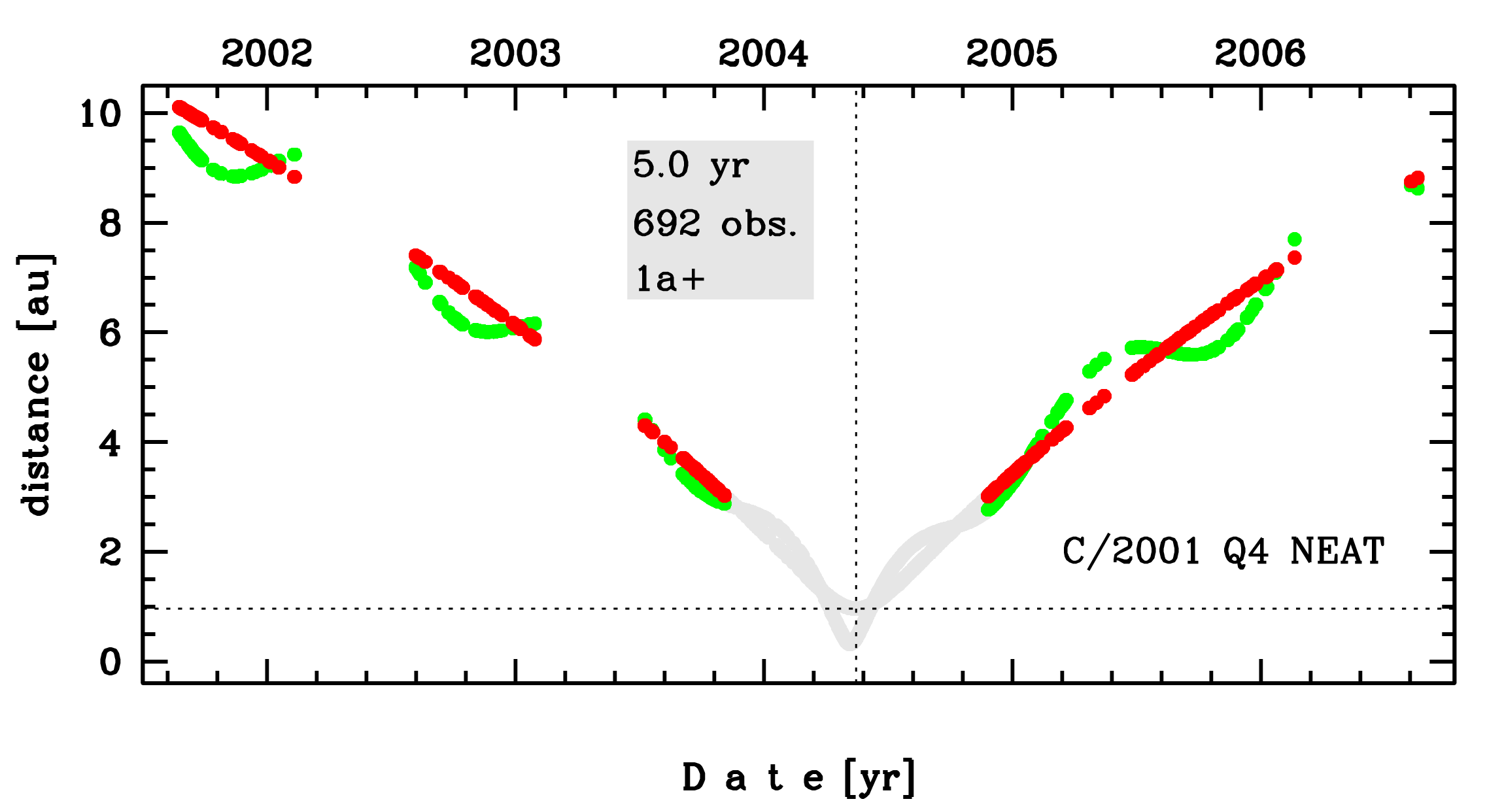C/2001 Q4 NEAT
more info
Comet C/2001 Q4 was discovered on 24 August 2001 by Near-Earth-Asteroid Tracking Team (Jet Propulsion Laboratory), that is about 2.8 yr before its perihelion passage. It was observed until 18 August 2004.
Comet had its closest approach to the Earth on 6 May 2004 (0.321 au), ten days before its perihelion passage.
C/2001 Q4 is a comet with non-gravitational effects strongly manifested in positional data fitting. Preferred orbital solution given here is based on data spanning over 4.98 yr in a range of heliocentric distances from 10.11 au to 8.82 au; however data taken around perihelion passage are excluded (see figure).
This Oort spike comet suffers rather large planetary perturbations during its passage through the planetary system; these perturbations lead to escape the comet from the planetary zone on a hyperbolic orbit (see future barycentric orbits).
More details in Królikowska, Dybczyński and Sitarski and Królikowska 2020.
Comet had its closest approach to the Earth on 6 May 2004 (0.321 au), ten days before its perihelion passage.
C/2001 Q4 is a comet with non-gravitational effects strongly manifested in positional data fitting. Preferred orbital solution given here is based on data spanning over 4.98 yr in a range of heliocentric distances from 10.11 au to 8.82 au; however data taken around perihelion passage are excluded (see figure).
This Oort spike comet suffers rather large planetary perturbations during its passage through the planetary system; these perturbations lead to escape the comet from the planetary zone on a hyperbolic orbit (see future barycentric orbits).
More details in Królikowska, Dybczyński and Sitarski and Królikowska 2020.
| solution description | ||
|---|---|---|
| number of observations | 692 | |
| data interval | 2001 08 24 – 2006 08 18 | |
| data arc selection | only data taken in large heliocentric distance (DIS) | |
| range of heliocentric distances | 10.11 au – 0.96 au (perihelion) – 8.82 au | |
| type of model of motion | NN - non-gravitational orbits for dedicated g(r)-like function | |
| data weighting | YES | |
| number of residuals | 1369 | |
| RMS [arcseconds] | 0.57 | |
| orbit quality class | 1a+ | |
| orbital elements (heliocentric ecliptic J2000) | ||
|---|---|---|
| Epoch | 2001 07 30 | |
| perihelion date | 2004 05 16.06168017 | ± 0.00027230 |
| perihelion distance [au] | 0.96135931 | ± 0.00000281 |
| eccentricity | 1.00058354 | ± 0.00000160 |
| argument of perihelion [°] | 1.211921 | ± 0.000145 |
| ascending node [°] | 210.199565 | ± 0.000027 |
| inclination [°] | 99.563325 | ± 0.000022 |
| reciprocal semi-major axis [10-6 au-1] | -607.00 | ± 1.67 |
| non-gravitational parameters | ||
|---|---|---|
| A1 [10-8au/day2] | 2.2951 | ± 0.1072 |
| A2 [10-8au/day2] | -0.18827 | ± 0.02188 |
| A3 [10-8au/day2] | 0.74176 | ± 0.02944 |
| m | -1.90 | |
| n | 5.093 | |
| k | -4.6142 | |
| r0 [au] | 4.000 | |
| α | 0.0510 | |
